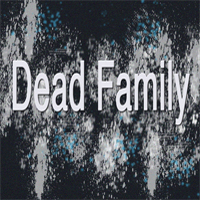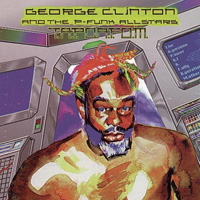 Rollins Band
Rollins Band
Come In and Burn (Dreamworks)
An interview with Henry Rollins
By Nik Rainey
So here I am, Mr. Hotshot Rock Journalist, crouching in a near-empty Avalon for a hastily-scheduled, last-minute interview with one of my childhood icons. The subject of my interview walks by me, and yet I don’t dare speak. I’ve done enough of these things and made enough tactical errors to know not to approach the artist directly – just wait for the tour manager to walk by (look for a furrowed brow, an impatient gait and a battered clipboard) and go through him. The interview’s scheduled for five, it’s now 5:15, so I know it probably won’t happen for another forty-five minutes yet, if I’m lucky. The last thing I want to do is act too bold and come away feeling like an inveterate dork.
Suddenly my subject, walking by a third time, stops. Henry Rollins is looming, no, towering over me. He looks none too pleased when he realizes who I am and why I’m here. “I thought we were doing this at five,” he says. “Haven’t I walked by you three times already?” I gulp and nod. “Let me give you some advice,” he says with the precise tones and this-is-the-last-of-my-patience smile of a day-care supervisor who rips the arms of his charges off when they don’t play nice, “if you don’t have a big sign saying who you are when I walk by, I won’t know that you’re the one I’m supposed to be talking to unless you speak up. Let’s do it over here,” he says through an exasperated sigh, gesturing toward the empty bar.
I follow.
Feeling like an inveterate dork.
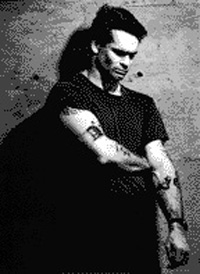 I suppose I should have known better. Henry Rollins’ straight-up, no-games attitude is not typical rock star behavior, but then, he’s not your typical rock star. At a moment in time when the communal, do-it-yourself ethic of punk rock has (d)evolved into the elitist, what’s-in-it-for-me? stance of alternative, Rollins straddles the line between the two worlds, part of both but belonging to neither. He has a long history of screwing with expectations and pissing off the status quo. When Black Flag, the band he bellowed for in the eighties, grew out their hair to hippie length and added sludgy Black Sabbath riffs and tempos to their signature sound, they enraged their audience like no one since Bob Dylan strapped on an electric guitar at the Newport Folk Festival and whipped a nation of finger-picking pacifists into a murderous frenzy. (In both cases, the schmucks deserved it.)
I suppose I should have known better. Henry Rollins’ straight-up, no-games attitude is not typical rock star behavior, but then, he’s not your typical rock star. At a moment in time when the communal, do-it-yourself ethic of punk rock has (d)evolved into the elitist, what’s-in-it-for-me? stance of alternative, Rollins straddles the line between the two worlds, part of both but belonging to neither. He has a long history of screwing with expectations and pissing off the status quo. When Black Flag, the band he bellowed for in the eighties, grew out their hair to hippie length and added sludgy Black Sabbath riffs and tempos to their signature sound, they enraged their audience like no one since Bob Dylan strapped on an electric guitar at the Newport Folk Festival and whipped a nation of finger-picking pacifists into a murderous frenzy. (In both cases, the schmucks deserved it.)
Every move Rollins made from then on was an affront: chastised by the finger-pointing brigade for writing lyrics of brutal self-loathing, sneered at by the pre-literate punk faction for daring to write and publish his own books, and maintaining a high public profile throughout (for a while, it seemed he was on MTV more often than Jenny McCarthy’s tongue), Rollins committed the cardinal sin of punk rock – he neither burned out nor faded away into preaching-to-the-converted underground oblivion. He’s therefore found himself in a strange position – to some, he’s the elder statesman of hardcore, to others, a blustering caricature. Either way, the image tends to overshadow the work. “If you’ve been around for a long time, you get perceived as somewhat of a target,” he says. “I’ve been around ten years longer than just about everything that’s in the Top 40, and we just get (mimes being hanged). I read a review of our record (Come In and Burn, his first release on Dreamworks) in Spin and the guy talked about the music for one sentence and spent the rest of the review ripping on me. It didn’t even sound like he listened to the words or the playing, which is not some dumb heavy metal thing, far from it.” You really seem to be the critics’ whipping boy, I suggest. “Yeah, but what they call a whippin’ is like the flutter of butterfly wings on my neck. If you play music that’s really charged and lyrically up-front, you get critically slammed. The industry, or at least music critics, seem to favor the obscure, hidden pop lyric. If you say what you mean these days, you get panned for it. I know I do. But they can say what they want – I don’t really care. You wanna give me a whippin’, it’s not impossible, but you’d better bring something big, ’cause I can take a lot of pain.”
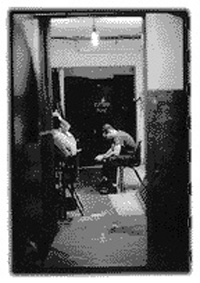 Ah, yes, pain. If there’s one thing that connects the many projects that bear Rollins’ imprint, one sinewy thread running through it all, it’s that. You get the impression that he puts himself through the rigors of constant touring, writing, recording, and publishing just to feel the burn. It’s an insanely courageous act – rock ‘n’ roll as survivalist course. But do the math – the man’s thirty-six. Surely it has to have taken some toll on him. “Only on my throat,” he rasps, popping a Fisherman’s Friend into his mouth. “I just have this weird work ethic – I’m just into rocking out, just getting out there and kicking ass. I’m not a musician, so it’s not a musician thing, it’s almost like a jock thing – I just wanna get there and sweat. It’s never ` aaaaahhhhh‘ with me, it’s more like `booga-booga, here I come again.’ I just wanna get out there and do the work.”
Ah, yes, pain. If there’s one thing that connects the many projects that bear Rollins’ imprint, one sinewy thread running through it all, it’s that. You get the impression that he puts himself through the rigors of constant touring, writing, recording, and publishing just to feel the burn. It’s an insanely courageous act – rock ‘n’ roll as survivalist course. But do the math – the man’s thirty-six. Surely it has to have taken some toll on him. “Only on my throat,” he rasps, popping a Fisherman’s Friend into his mouth. “I just have this weird work ethic – I’m just into rocking out, just getting out there and kicking ass. I’m not a musician, so it’s not a musician thing, it’s almost like a jock thing – I just wanna get there and sweat. It’s never ` aaaaahhhhh‘ with me, it’s more like `booga-booga, here I come again.’ I just wanna get out there and do the work.”
That balls-out attitude extends not only to the work he does, but the work he loves. Even his choice of favorite movie,Caddyshack, doesn’t seem so out of character when he explains it. “Bill Murray, Brian Doyle-Murray, all those guys came out of Second City – you know, hardcore improv, just get out there and wing it. Look at early Saturday Night Live – they had minimal sets, just a table and chair, and they made it cook through sheer energy. There was just so much spark there. Improv is so much easier for me, so much more comfortable. I’d do much better if you gave me a situation and told me to run with it than if you gave me a script to go by. When I was in The Chase, that’s how we did it – most of the takes were just, `Okay, be funny. Action!’ Sometimes it worked, sometimes it didn’t.” (Judging by the way the movie came out, it’s hard to say which of the two they kept.)
The movie stuff is more of a lark, but his heart and soul rests in the output of his publishing company/record label, 2.13.61, and Infinite Zero, the reissue label he started with American Recordings head Rick Rubin (he also has a new label, Human Pitbull, but I bet he’s just doing it to show off). It’s certainly no cash cow – “If it weren’t for my label, I’d have a quarter of a million in the bank right now. This keeps me in constant debt,” he says – but getting the output of his favorite musicians, photographers, and writers out is far more important to him. “My salary at Infinite Zero is twenty-five copies of each CD. I don’t want the money. With the salary they’d give me we could’ve licensed ten records, so fuck that. Some money I don’t need. I like TriStar’s money, money from Fox, money that’s dripping in the blood of minimum wage people getting shit on so other people can get boob jobs and fake tans, I like that money. Taking money that’s got `new BMW’ written all over it and using it to put out art records – that’s the bitchin’ ju-jitsu move. That’s why when people say, `you’re an asshole, you’ve sold out,’ I’m like, man, if you just take twenty seconds to check out what I’m doing, it is so cool! It’s insidious, like Hogan’s Heroes – `Thanks, Klink,’ buy off the guard dog and let everyone out.”
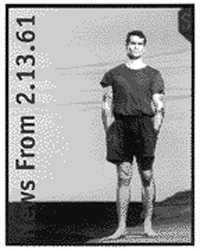 In many ways, this is the most impressive work he does. Through 2.13, Rollins has brought the works of Hubert Selby Jr. (Last Exit to Brooklyn) back into print and has also given voice to such visceral writers as Vietnam vet Bill Shields, guerrilla filmmaker Nick Zedd, and his good friend Nick Cave, all of whom have new books out or forthcoming. Infinite Zero has brought records back from the dead from Devo and Gang of Four to seminal punk noisemakers the Monks. “It’s amazing how many people are kissing our ass over that release. I was at MTV the other day and Kurt Loder was all over me. `Henry. The Monks. Thank you.’ `Uh…okay.’ Even Ian MacKaye, who I’ve known for over twenty years, emailed me the other day and said `Thanks for sending me the Monks CD. I’ve got some bootleg videos if you ever want to see them,’ and I’m like, ` You?’ I had no idea.” He also sent five copies of it to a particular Monks fan, perhaps the only skinny, pale Englishman who could intimidate this rough-‘n’-tumble titan.
In many ways, this is the most impressive work he does. Through 2.13, Rollins has brought the works of Hubert Selby Jr. (Last Exit to Brooklyn) back into print and has also given voice to such visceral writers as Vietnam vet Bill Shields, guerrilla filmmaker Nick Zedd, and his good friend Nick Cave, all of whom have new books out or forthcoming. Infinite Zero has brought records back from the dead from Devo and Gang of Four to seminal punk noisemakers the Monks. “It’s amazing how many people are kissing our ass over that release. I was at MTV the other day and Kurt Loder was all over me. `Henry. The Monks. Thank you.’ `Uh…okay.’ Even Ian MacKaye, who I’ve known for over twenty years, emailed me the other day and said `Thanks for sending me the Monks CD. I’ve got some bootleg videos if you ever want to see them,’ and I’m like, ` You?’ I had no idea.” He also sent five copies of it to a particular Monks fan, perhaps the only skinny, pale Englishman who could intimidate this rough-‘n’-tumble titan.
“I’m hoping to work extensively with the Fall and re-release some of their early albums through Infinite Zero, but Mark E. Smith can be a little touchy to work with sometimes. Here’s a guy who the critics fear, they know that intellectually he can tear them a new one with his venom, he’s like the Rowan Atkinson of independent music – he’s barbed but it’s fuckin’ funny, he’s like Céline or someone, a rattlesnake who does stand-up. I hung out with him once and he was very cool to me. We were at this festival together and he walked by and I was like, ‘Woah, Mark E. Smith.’ I didn’t even bother trying to speak to him, but he came up to me and said (in a suave Mancunian voice) ‘Hullo, Henry.’ And he was just stinko! He was hilarious. I’m in awe of people like Mark and Nick and James Brown, I just don’t know how they do it.”
Speaking of which, Henry, through all the brickbats and barbs, how do you keep it going? “I don’t have a lot else to do. I’m not married, I don’t have any kids, I don’t have any close personal relationships at all. I live alone. I sleep on the floor. I see women occasionally. I just do my work. It doesn’t matter what anyone says. Look, I’m 36, I’ve been shot at, people have tried to stab me, I’ve been hospitalized, I’ve been beaten up, I’ve been broke, I’ve been wiretapped, I’ve been audited, I’ve been told to leave town, I’ve had policemen’s guns in my face, I’ve had drugs planted on me, I’ve been accused of rape by a girl I said no thank you to… so there’s not a whole lot that these people can do that really raises my heart rate. They sling the mightiest boulder they have and it’s like (catches a pebble and drops it on the ground). I’m hard on myself, which is part of the job, I think – when it’s good, it should be brief, one good breath of air and then back into the exhaust fumes.”
And, to my mind, that’s what Rollins is about. Think what you will about the man, he’s putting it out there. You can’t argue with sweat. What have you done lately?

